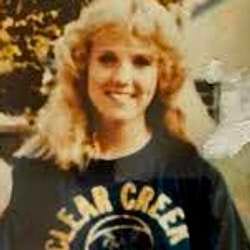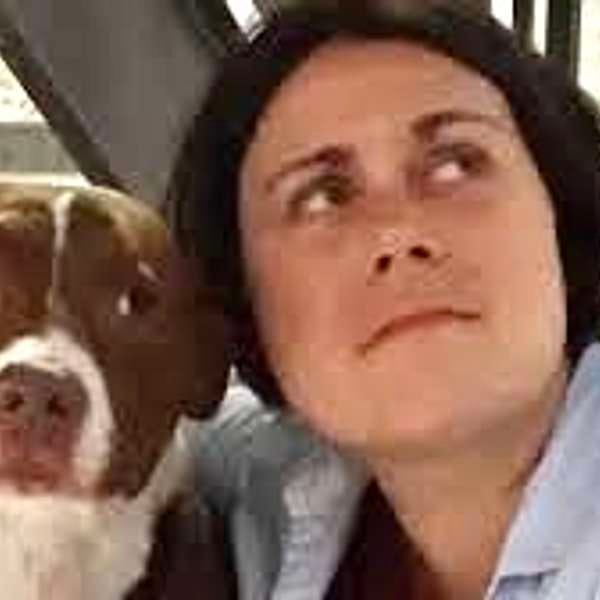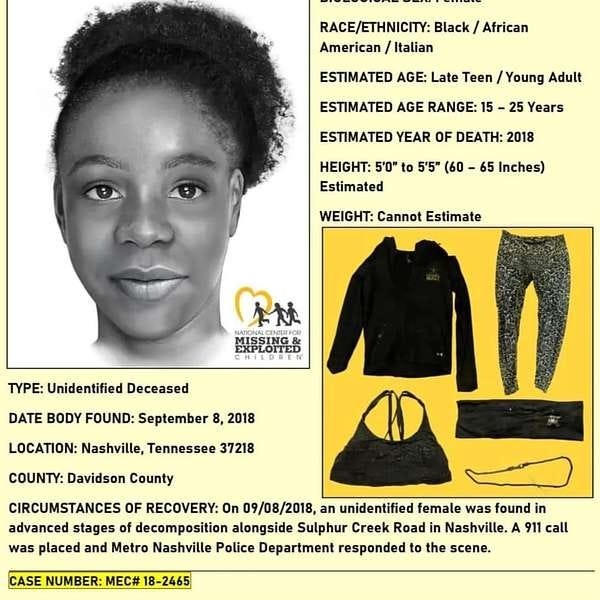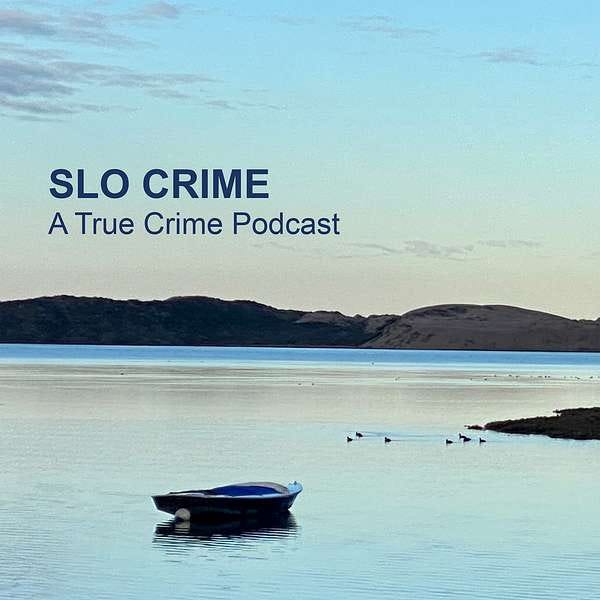Giving back dignity to victims: a true crime podcaster shares her passion
"Sometimes, just one small thing separates them from the listener or reader."
Welcome to 2025, everyone!
Please give a warm welcome to writer and true crime podcaster Shoney Sien, who runs the SloCrime podcast. Before I began listening to this podcast, I was unfamiliar with any of these cases. And that’s intentional on Shoney’s part. She wants to highlight cases that might not be widely-known in the true crime genre’s community. But these missing and murdered people are just as important as the better known victims.
I ran into Shoney on the forums of Sisters in Crime’s online chapter, the Guppies. When she mentioned starting a podcast, my interest piqued: I’d just started listening to podcasts during my morning run. I knew I needed to interview her!
Podcast description: SLO Crime explores lesser-known cases of murdered and/or missing people...and the often slow nature of justice. (from website)
Shoney, welcome!
What inspired you to start a true crime podcast?
I am writing a mystery based in San Luis Obispo. As I was writing along, I realized—I met a fictional character who becomes important to the story and hosts a local true crime podcast called SLO Crime. In particular, she is interested in a serial killer who lived and killed young women in the area where my victim disappeared.
As I was researching stories in archived newspapers, I was haunted by unsolved cases of murdered and/or missing women.
And kind of backwards I began a podcast…. modeled on and after my fictional character’s podcast. That’s how my real podcast, SLO Crime began.
Have you always been interested in true crime?
I have always enjoyed reading mysteries. True crime is complicated for me because things happened around me, such as the abduction and murder of Julie Speerscheider, for example, she’s featured in an Episode of SLO Crime. Julie and I worked together as women barely out of our teens in Madison, Wisconsin. She disappeared while she was hitchhiking from a spot where I had a scary hitchhiking encounter just a few weeks before.
For most of my adult life, I’ve lived in Santa Cruz County, often referred to as the “Murder Capital of the World” due to some famous murder sprees that occurred in the 1970s and 1980s. I don’t think we deserve that title anymore. Of course, I also lived in Boulder, one block away from the famous Jon-Benet Ramsey murder. So, true crime follows me. Maybe that’s not a good look.
You're obviously passionate about sharing lesser-known unsolved murder cases. How do you find these cases?
I go down rabbit holes. There are so many cases that don’t get any attention because the victims are poor, or women of color, or LGBTQ. I research many cases that I will never cover, sometimes there is not enough information to create an episode. The cases that make it onto the show---GRAB ME---they reach out, just like my fictional characters who demand to be part of my mystery. In the episode with Andrea Hug, she felt like a friend, someone I would have known at the time. It is the same with Alex Herman. Debbie Lee Shelton and Arlene Kazuko Tsuji lived near me, in my safe neighborhood where I would be comfortable walking any time of the day or night.
I am even more passionate now that the podcast has gained traction across the country, and let’s see….as of today, 12 other countries…so across the world.
I have heard from families and friends of victims I featured in some of my episodes who have sent long, heartfelt thank you notes. People are grateful that someone is remembering their loved one. This always moves me to tears and reminds me to treat every case—and even my fictional characters—as though someone who loved them is going to hear/read about them.
On my podcast and in my fiction, I want my “victims” to be real people, with real interests and flaws, people who are funny and sad and make mistakes. And sometimes, just one small thing separates them from the listener or reader.




What kind of research do you do before recording the podcast?
The thing that surprises me most---besides the crazy way the podcast has gained traction---is the amount of research and writing it takes. I spend at least twenty hours a week researching and writing each episode. Then I have to record. It takes time from my fiction writing, and in 2025, I aim to find a better balance between these two worlds.
Some, if not all, of these crimes must be emotionally difficult to research. How do you put aside your natural emotions and logically analyze and absorb the information?
They are all emotionally difficult. I have cried over every one of these cases, but the more I feel, the more important it seems to get the information out there to help bring justice to these families. There are some kinds of cases that I haven’t covered and might never cover. I usually don’t reveal what those kinds of cases are, but here goes: cases involving guns. I hate guns and I don’t know how you solve cases that involve guns. I’m not saying I will never feature one, but it is not likely.
"True crime" is sometimes accused of sensationalizing crime as entertainment. How do you avoid doing that in your podcast?
This is such an important question. The entertainment aspect of true crime shows/movies/books---and even fiction, mysteries….is deeply disturbing. I think I write about true crime both in my mysteries and podcast to try to make sense of things in the world that don’t make sense. In both the podcast and fiction, I treat every “victim” and family/friend/community member with dignity. I feel honored that friends and families have praised my podcast for doing that.
What responsibility does a true crime writer/podcaster bear toward survivers of the crime, such as relatives or friends of the victim?
A lot! See above. And yet, in the Lucy Letby case, which I covered in my first two-part podcast episode, I am balancing her rights to have a fair trial with the feelings/grief of parents who’ve lost their infants. I address it in a statement at the front and end of the episode. Balancing a person’s right to a fair trial with the rights of the survivors is a hard balance. If a family or friend ever asked me not to cover a case, I would honor that.
Why do you think true crime as a genre (both in writing and podcasting) is important?
At heart, I’m a storyteller. This is a way of getting stories out there that need to be told and trying to find justice for victims.
What is your goal for this podcast? Where do you hope to see it in 2-4 years?
I wish I had asked myself this question before I started the podcast. I jumped in, and it took off, and now it is leading me. We shall see.
You're also a fiction writer. What type of fiction do you write?
When I was younger, I wrote short stories that were published in small press collections.
I am completing my second mystery: So Long Blue. I always wonder if I fit into any genre. My writing group says it’s a literary mystery, maybe a psychological thriller. It is very character and landscape focused.
My first mystery, just about complete, When Miltie Went to Vegas, also fits the above description. A grieving, country-western singing midwestern farmer gets talked into going on a parish trip to Vegas, by his hard-drinking priest buddy….and the fun begins.
Where can readers find you and your podcast online?
My podcast is called SLO Crime; A True Crime Podcast. Here is the link.
https://slocrime.buzzsprout.com
My writing website, which I admit I don’t check often…
Thank you, Shoney, for sharing your work with us! Check out her podcast and the various cases, still unsolved. If you have any information about these victims, either missing persons or murder victims, please contact law enforcement.
In other news, I am continuing to publish a serialization of my rather awful YA rom-com, Pawfect Partners. Chapter 9, “PDA rocks”, was published last Friday. If you’d like a break from the post-holiday blues, here’s a good chance to laugh at my attempts to write a rom-com!






Laura, true crime hits a little too close to home in my case for me to enjoy reading it, but this interview handled the hard parts of writing true crime deftly and with the utmost respect for survivors and those who care for them as well as readers. Well done!